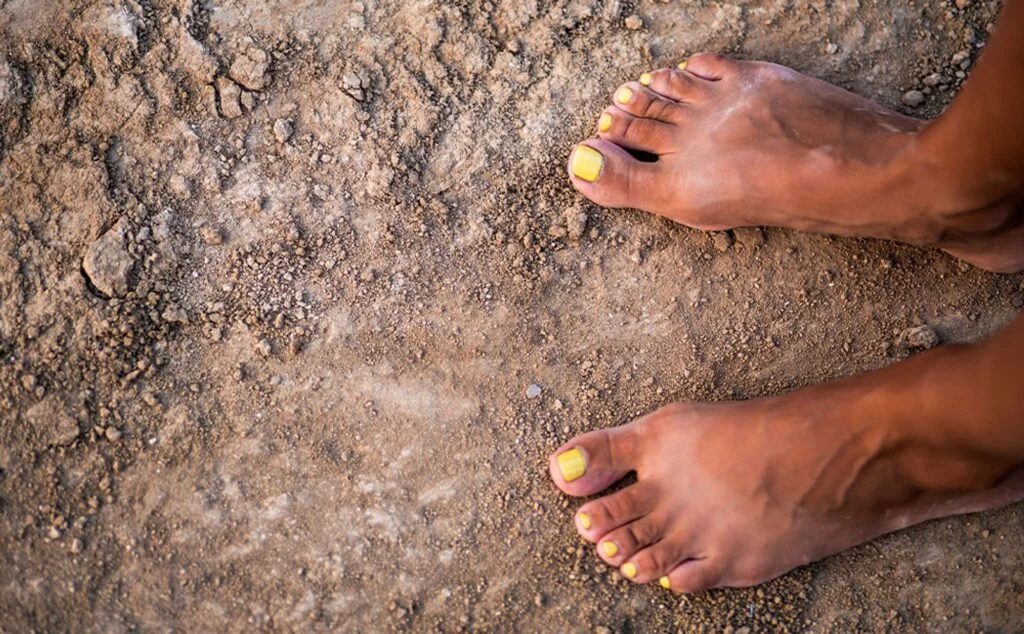
Grounding is a practice of direct skin contact with the surface of the Earth — think going barefoot on the grass, in the sand, or any situation that has your feet touching the earth. Proponents say connecting with the earth in this manner has a variety of benefits for our health and well-being, and that includes sleep quality. We spoke with clinical psychologist Kelsey Latimer for specifics about grounding and how to practice it for a better night’s sleep.
Key Takeaways
- Grounding is a practice of direct contact with the Earth to improve health and well-being.
- There is some evidence that grounding, or earthing, can help reduce inflammation, pain and anxiety, among other benefits.
- Daily grounding may also improve sleep quality by reducing inflammation.
What Is Grounding?
Grounding, or earthing, is any direct contact with the earth, like walking barefoot on the beach or lying on the lawn. “Earthing is a newer term, and in the therapy world, they’re considered interchangeable terms,” explains Latimer. According to the Earthing Institute, connecting to the ground in this manner helps you absorb electrons from the surface of the earth, which may stabilize your body’s own bioelectrical circuits (1) and lead to various health benefits.
There’s a mental component as well. When practicing grounding, Latimer says we eliminate both distracting external stimuli like phones and devices and internal stimuli such as anxious thoughts and fears. “We then have the opportunity to move from the anxiety in our head, which holds future and past thinking and worries, to our bodies, which holds the present moment,” she adds. “Because our senses are in tune with the nature around us, it is especially calming to the nervous system and helps us stay in this moment in time.”
The Benefits of Grounding
While it may sound a little alternative, Latimer says that grounding or earthing are evidence-based practices. “Grounding has a lot of scientific backing,” she says. Research shows that grounding can improve inflammation and free radical damage, reduce pain and anxiety, and hasten wound healing (2). Another small study with 40 participants found that grounding or earthing can also help with mood (3).
It’s important to note that many of these studies are small, and some use self-reported data. Still, there’s a lot of anecdotal evidence that grounding offers benefits. “Grounding is perhaps one of the most calming nervous system activities we can do,” says Latimer. “It works the same if we are under-stimulated and need to up-regulate our nervous systems in the middle of the day or when we wake up exhausted.”
Grounding and Sleep
Since most of us sleep in beds, a grounding mat is the standard practice if you’re hoping to use this practice for better sleep. These products use the grounding port in a standard electrical outlet (the hole at the bottom of a three-prong outlet) to tap into the grounding system. According to the Earthing Institute, you can get the same health benefits with a grounding mat as you would by grounding outdoors.
A clinical review from 2012 concluded that grounding in nature or via a mat could be a simple yet effective strategy for poor sleep, among other ailments (4). A more recent, albeit small, study of 15 participants over a 12-week period found that grounding with a mat was associated with improved sleep quality in patients with mild Alzheimer’s disease (5).
How to Practice Grounding for Better Sleep
The most effective way to practice grounding is simply walking on grass or soil. By doing so, the theory goes, you ground the body with the free electrons abundantly found on the earth’s surface to reduce inflammation. Inflammation is associated with sleep disturbances, so daily grounding outside may improve your nights (6).
A grounding mat is another option. These mats are generally made with a conductive carbon material to better conduct the Earth’s energy. They’re designed to go over your mattress and plug into a grounded outlet to create an electrical connection between the earth and your body. During the day, these mats can be placed underfoot while you work for grounding throughout the day.
FAQs
Is grounding a real thing?
Research on grounding is still relatively limited, but there are some smaller studies that point to benefits like improved sleep quality and lower stress. Proponents of grounding say the practice can help calm the nervous system, as it helps keep us anchored in the present moment.
Are earthing and grounding the same thing?
Yes, though earthing is a newer term, it’s considered interchangeable with grounding.
How effective is earthing?
There’s some evidence that shows earthing is an effective practice. However, more studies are needed to verify the health benefits.
The Last Word From Sleepopolis
More research is needed to verify the benefits of grounding and grounding mats, but either way, connecting with nature is often good for our general wellness. (7) While grounding might be worth exploring for better sleep, “sleep hygiene needs to be the initial practice for sleep before adding anything else,” says Latimer. Following consistent sleep and wake times, turning off screens a few hours before bed, creating a soothing sleep sanctuary, and maintaining the same relaxing bedtime routine will help create an association with restful sleep, she explains. Don’t rush it, either. “It takes time to negotiate this relationship, especially if you don’t have good sleep hygiene habits,” adds Latimer. Between that and a little time connecting with the earth outside, you may find yourself sleeping much more soundly.
Sources
Latimer, Kelsey. Personal Interview. November 2024.
- What is Earthing. The Earthing Institute. https://earthinginstitute.net/what-is-earthing/
- Oschman JL, Chevalier G, Brown R. The effects of grounding (earthing) on inflammation, the immune response, wound healing, and prevention and treatment of chronic inflammatory and autoimmune diseases. J Inflamm Res. 2015 Mar 24;8:83-96. doi: 10.2147/JIR.S69656. PMID: 25848315; PMCID: PMC4378297.
- Chevalier, G. (2015). The Effect of Grounding the Human Body on Mood. Psychological Reports, 116(2), 534-542. https://doi.org/10.2466/06.PR0.116k21w5
- Chevalier G, Sinatra ST, Oschman JL, Sokal K, Sokal P. Earthing: health implications of reconnecting the human body to the Earth’s surface electrons. J Environ Public Health. 2012;2012:291541. doi: 10.1155/2012/291541. Epub 2012 Jan 12. PMID: 22291721; PMCID: PMC3265077.
- Lin CH, Tseng ST, Chuang YC, Kuo CE, Chen NC. Grounding the Body Improves Sleep Quality in Patients with Mild Alzheimer’s Disease: A Pilot Study. Healthcare (Basel). 2022 Mar 20;10(3):581. doi: 10.3390/healthcare10030581. Erratum in: Healthcare (Basel). 2022 May 26;10(6): PMID: 35327058; PMCID: PMC8954071.
- Irwin MR, Olmstead R, Carroll JE. Sleep Disturbance, Sleep Duration, and Inflammation: A Systematic Review and Meta-Analysis of Cohort Studies and Experimental Sleep Deprivation. Biol Psychiatry. 2016 Jul 1;80(1):40-52. doi: 10.1016/j.biopsych.2015.05.014. Epub 2015 Jun 1. PMID: 26140821; PMCID: PMC4666828.
- 3 ways getting outside into nature helps improve your health. cultivating-health. Published May 3, 2024. Accessed November 9, 2024. https://health.ucdavis.edu/blog/cultivating-health/3-ways-getting-outside-into-nature-helps-improve-your-health/2023/05


























